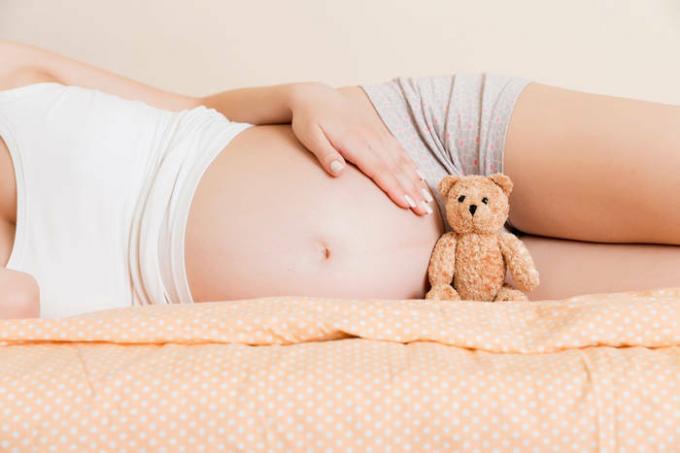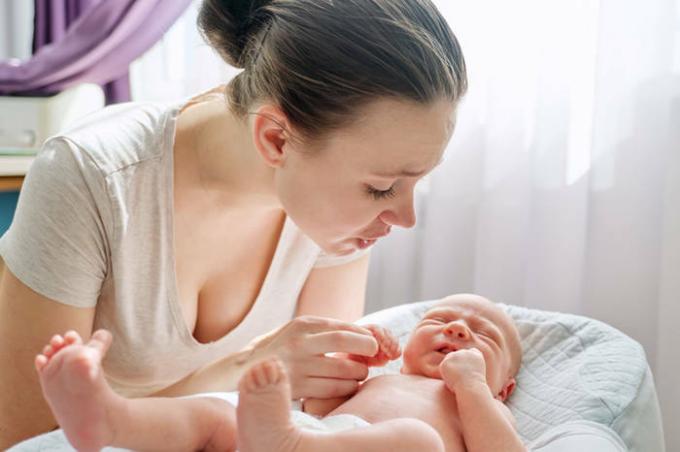How is the second pregnancy different from the first? Early toxicosis, obvious tummy, chronic fatigue and 7 more nuances that the expectant mother of the second child needs to prepare for
When a woman decides to “go for the second”, she basically already knows what to expect from the body. During the first pregnancy, all books were read, all lectures were listened to, and even special courses were taken. However, reality very often does not live up to expectations. After all, each new child (as well as the process of carrying it) is different from the previous one. What can be a surprise for a future mother during her second pregnancy? We found at least 10 differences.
1. "Early" tummy

Pregnant tummy appears earlier for the second time / istockphoto.com
Unfortunately, after the first birth, the uterus does not contract to its original size. For this reason, it is so difficult for a woman who has given birth to achieve the "flat stomach" effect. And it is for the same reason that during the second pregnancy, the tummy will appear earlier: according to the observations of experienced mothers, already at 12-14 weeks, others will notice that you are expecting a baby.
2. Earlier wiggling of the baby
The first "hello" from the baby during the second pregnancy, you can recognize as early as 13-14 weeks. However, this does not mean that the child will be hyperactive. Just taking into account your previous experience, you already clearly understand the difference between fetal movement in the uterus and, for example, intestinal peristalsis. Therefore, you ignore the "gases", but react to the child's movements more sensitively.
3. Low presentation
No matter how hard you try, your abdominal muscles stretch during pregnancy. Exercises can only bring them into tone, but in no way "pull" them to their previous state. Therefore, during the second pregnancy, the tummy is located lower, because it is more difficult for stretched muscles to resist the force of gravity. Because of this, expectant mothers of their second child are highly recommended to wear a bandage already in the early stages. This will allow you to maintain the usual activity, relieve discomfort in the pelvic region and reduce possible risks for the development of the child.
4. Higher likelihood of toxicosis

Toxicosis in second pregnancy may be worse / istockphoto.com
If during your first pregnancy toxicosis bothered you only occasionally, there is no guarantee that everything will go as smoothly the second time. Rather, on the contrary: many women note that during the second pregnancy, toxicosis begins earlier and manifests itself more strongly. There is no medical explanation for this fact: perhaps the whole point is in psychology, and also in the fact that with a second child, a woman objectively cannot devote much time to her body.
Regardless of whether you were tormented by toxicosis before, take care of its prevention. Spend more time outdoors, drink more water (often and in small sips), switch to fractional meals (5-6 meals meals per day) and try to have breakfast without getting out of bed (have a banana, a handful of crackers, or nuts).
5. Chronic fatigue
You will start to get tired during the second pregnancy more often and more strongly than during the first one. There are both objective and subjective reasons for this. Firstly, your body "from old memory" much earlier and in greater concentration will begin to produce progesterone, which causes a feeling of fatigue and drowsiness. Secondly, no one canceled the care of the first child, and in fact, against the background of your pregnancy, he may require increased attention. It’s exhausting much more than the job you were running briskly to with your firstborn in your belly.
6. Emotional "swing"
An unstable emotional state is, in principle, characteristic of the period of bearing a child. However, during the second pregnancy, you may be "pushed" to tears for no reason much more often. Firstly, the reason may be commonplace fatigue and lack of sleep. Secondly, many mothers are tormented by doubts - whether they will be able to take care of the second child without prejudice to the first. On this basis, depressive states can even develop, so listen carefully to yourself, rest more and, if necessary, do not be afraid to visit a psychologist.
7. Exacerbation of diseases

All chronic diseases can come to the fore / istockphoto.com
The second pregnancy is characterized by the fact that all hidden (or earned during the first pregnancy) sores come out. So, a woman's lower back begins to hurt much earlier. A new load on the legs can lead to varicose veins (even if it was not there before, or it went away after the first pregnancy). Due to varicose veins, expectant mothers of their second child are twice as likely to encounter such an unpleasant phenomenon as hemorrhoids. The risk of developing gestational diabetes also increases during the second pregnancy. And of course, hair falls out more intensively.
8. Training contractions
Experienced mothers begin to feel training contractions much earlier during their second pregnancy. Usually, the uterus begins to contract and prepares for childbirth as early as the beginning of the third trimester. The number and intensity of false contractions are likely to be higher as well. Therefore, mom will have to be a little nervous.
9. Rapid labor
Already at 36 weeks, you definitely need to collect the "generic bag", keep it in a conspicuous place and not go far from home. Indeed, during the second pregnancy, childbirth can begin earlier and go faster than the first. This is due to the fact that a woman who has given birth has a more elastic cervix: as a rule, it takes only 6 hours to open it. And from the beginning of real contractions to the birth of a baby, it can take only 2-4 hours.
10. Long-term recovery

Postpartum recovery takes longer / istockphoto.com
Each pregnancy is a load on the body, after which it needs time to recover. Be prepared for the fact that the second time it will take more. The duration of the postpartum period usually stretches from 6-8 weeks to three months. And most likely, you will have to help your body. For example, it is much more difficult for the uterus to contract after the second birth than after the first. Therefore, it is highly desirable do Kegel exercises. Also, after the second pregnancy, women often develop diastasis - it also does not "go away" on its own, you will have to work on the abdominal muscles.
You will also be interested to read:
TOP 11 reasons why you need to give birth to a second child
Second births: the main myths to forget about

